Jinja is located right where Lake Victoria flows into the White Nile. Founded by British settlers in 1901, the past and present of this tiny city are centered on its relationship with the world’s longest river.
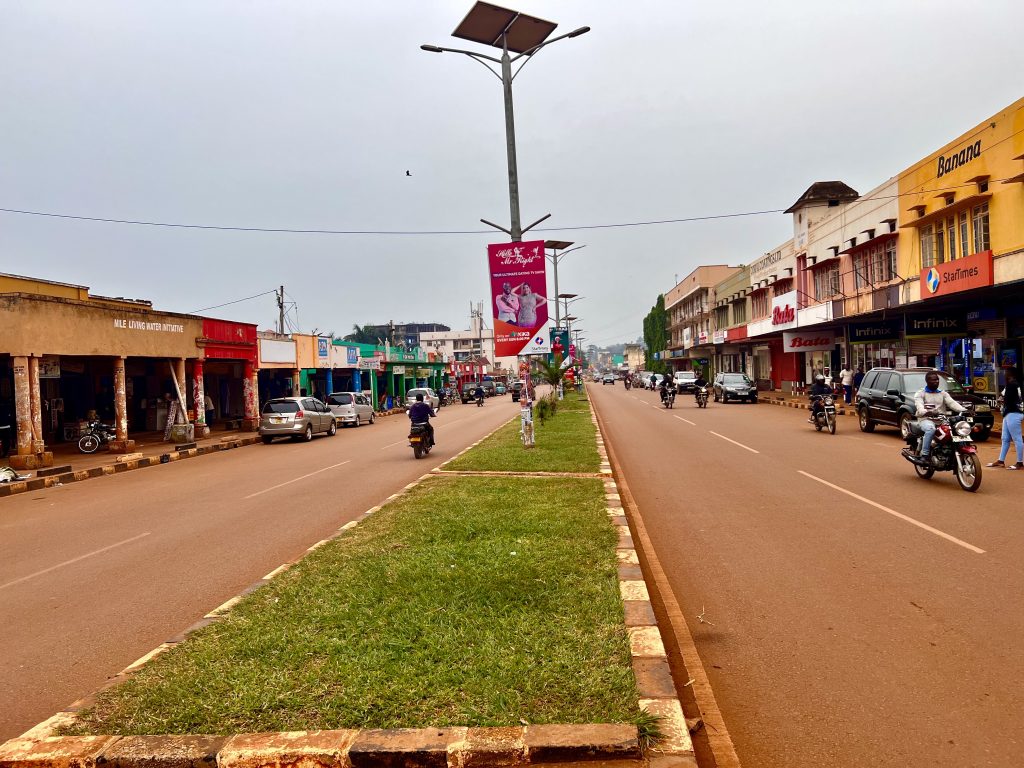
Officially a city with just 300,000 inhabitants, this vibrant settlement in eastern Uganda is the undisputed second economic center of the country, after Kampala. However, in terms of population, it ranks 14th. Jinja’s economic strength is easily apparent: the Nalubaale Dam (formerly the Owen Falls Dam) made the town a manufacturing hotspot as early as the 1950s.
Jinja also features a wide selection of hotels, cafés, and restaurants that are in a league above what you find elsewhere in Uganda, except in some parts of Kampala. Here, you may actually be forgiven for thinking you are in Kenya!
Fontes Nili Quærere – The Historic Quest for the Source of the Nile
The Quest for the Source of the Nile kept captivating people’s minds for at least 3 millennia. The old Romans used the term “Fontes Nili quærere” or “Nili caput quaerere” (“searching for the source of the Nile”) as a euphemism for attempting the impossible. How many Egyptian, Roman, Arab, British, and other explorers lost their money, sanity, and lives in futile quests for the source of this majestic river, can only be speculated.
It wasn’t until 1863 that British officer and explorer John Hanning Speke after a previous near-fatal attempt together with Richard Francis Burton in 1855, established beyond reasonable doubt that the river flowing out from Lake Nalubaale (later known as Lake Victoria) in present-day Jinja was indeed the Nile.
Speke, who passed away aged 37, did not get to enjoy much recognition for his discovery: The fact that Lake Victoria is indeed the ultimate source of the river Nile was not universally accepted until Henry Morton Stanley’s expedition in 1884-1887 finally refuted the hypothesis that the waters of Lake Victoria originated from Lake Tanganyika.
To be specific, the lake known variously as Nalubaale, Nyanza, Ukerewe, Lolwe, and Victoria is not the only source of the Nile. However, it is the furthest from the Nile Delta, at a distance of 6,650 km, with water taking roughly 92 days to flow from Jinja to the Mediterranean Sea. Between Lake Victoria and Lake Albert, Africa’s seventh-largest lake, it is also labeled the Victoria Nile; from there, it becomes the Albert Nile until the Uganda-South Sudan border, and the Mountain Nile until Lake No in the Sudd swamplands. The White Nile proper then continues until its confluence with the Blue Nile in the Sudanese capital city of Khartoum. All these sub-labels notwithstanding, the water body flowing from Lake Victoria to Khartoum is more commonly referred to in its entirety as the White Nile.
The other main tributary to the waterway that empowered the Pharaohs of Egypt, the Blue Nile, starts at Lake Tana in Ethiopia. The famous and supposedly lovely Bahir Dar is Ethiopia’s Source-of-the-Nile city—another place on my bucket list!
Jinja – The Tourism Hub of Uganda
Jinja boasts a more advanced tourism sector than any other part of Uganda. Along with its array of enjoyable hotels, restaurants, and cafés, the area offers a wide selection of tourist activities, many unsurprisingly related to the Nile.
Water Activites
Rafting on the Nile is a must-do activity in Jinja, though the available options are limited to full-day experiences, making them less suitable for families with young children. Fortunately, there is a more family-friendly alternative: tubing, which offers a less adrenaline-packed but equally enjoyable adventure.
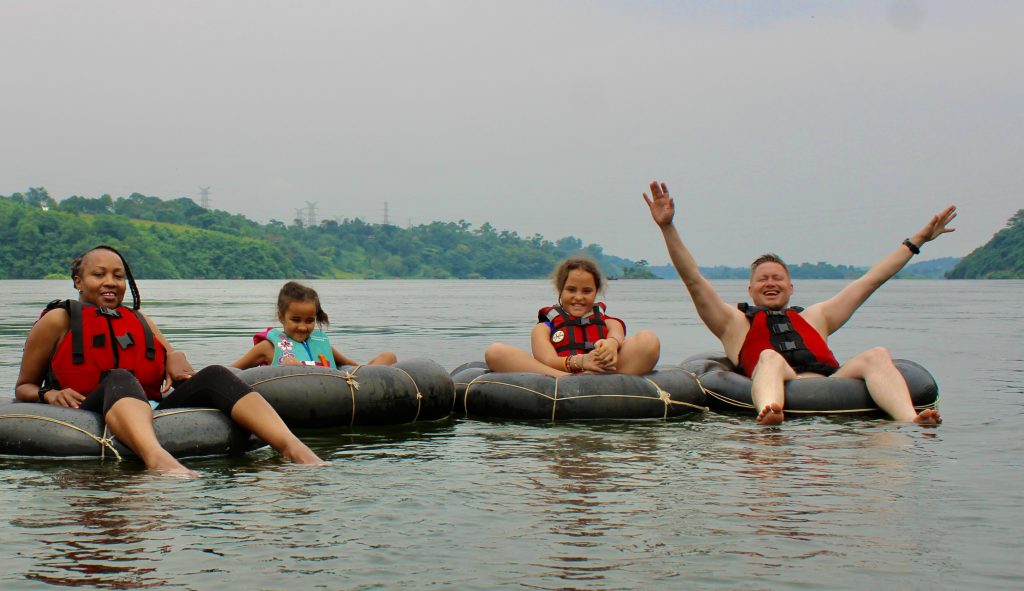
TMU Rafting, next to Jinja Nile Resort, is a popular starting point for rafting and tubing, and one of nearest and most easily accessible from Jinja. They also offer bungee jumping over the Nile, which may be an exciting prospect for some, but hardly a thrill for those of us who have tried it from the Victoria Falls Bridge between Zambia and Zimbabwe.
Kayaking and sports fishing are also widely available along the shores of the lake and river banks, so there is no shortage of options for waterborne exploration of Jinja and its surroundings.
Source of the Nile Cruise


When in Jinja, a Nile cruise is almost a mandatory experience. It typically takes you from the Sailing Club, past the geographical starting point of the Nile and the iconic Jinja Bridge, all the way to the Nalubaale Dam.
The demarcation point marks the official starting point of the Nile. Before the construction of the Nalubaale (formerly Owen Falls) Dam in 1954, the site was home to the now-submerged Ripon Falls. Characterized by its large, flat rocks, this mighty waterfall was called Ejjinja by the Busoga and the Baganda, inhabiting the east and west sides of the river respectively. Ejjinja, meaning “rock” in both languages, is also the origin of the name Jinja.
As part of the cruise, you get a brief stopover at a tiny floating souvenir shop featuring a Source of the Nile sign, only meters away from the actual demarcation point.
Most cruises start and end next to the Jinja Sailing Club, and what better way to conclude a scenic experience than with a relaxing drink in serene surroundings?
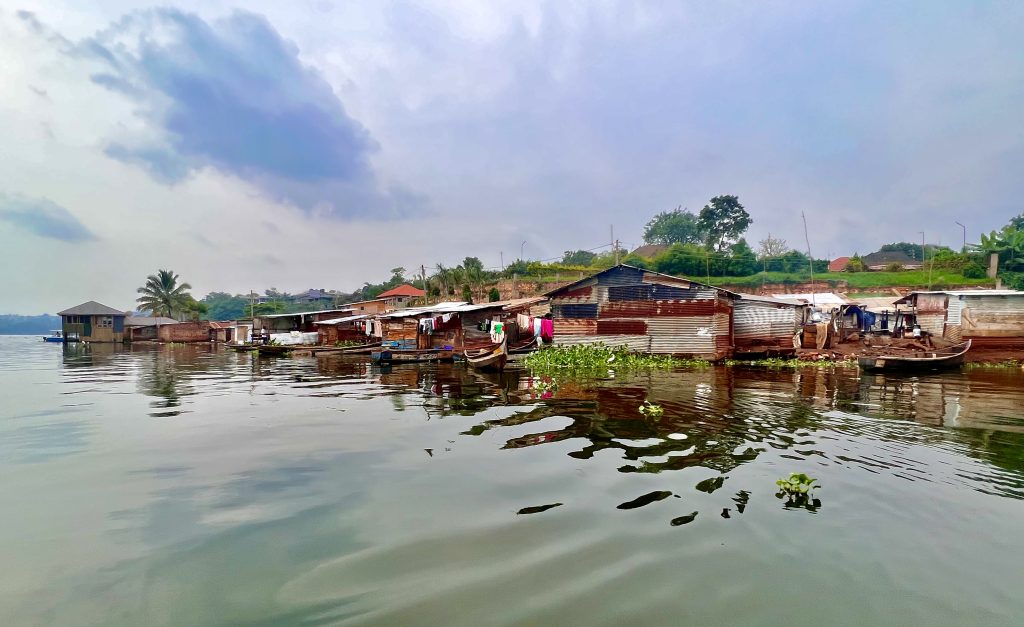
Hiking to the Griffin Falls and Ziplining in Mabira Forest
The Mabira rainforest, a 30-minute drive from Jinja, features a scenic hiking experience to the picturesque Griffin Falls, with a unique ziplining experience between the trees making this beautiful forest an attraction in a league of its own. The government of President Museveni had planned to raze most of the forest for a sugarcane plantation in 2007, but had to back down due to fierce popular resistance. Grand-scale vandalism of pristine nature is hardly a crowd-pleaser, even in a strongman regime like Uganda..
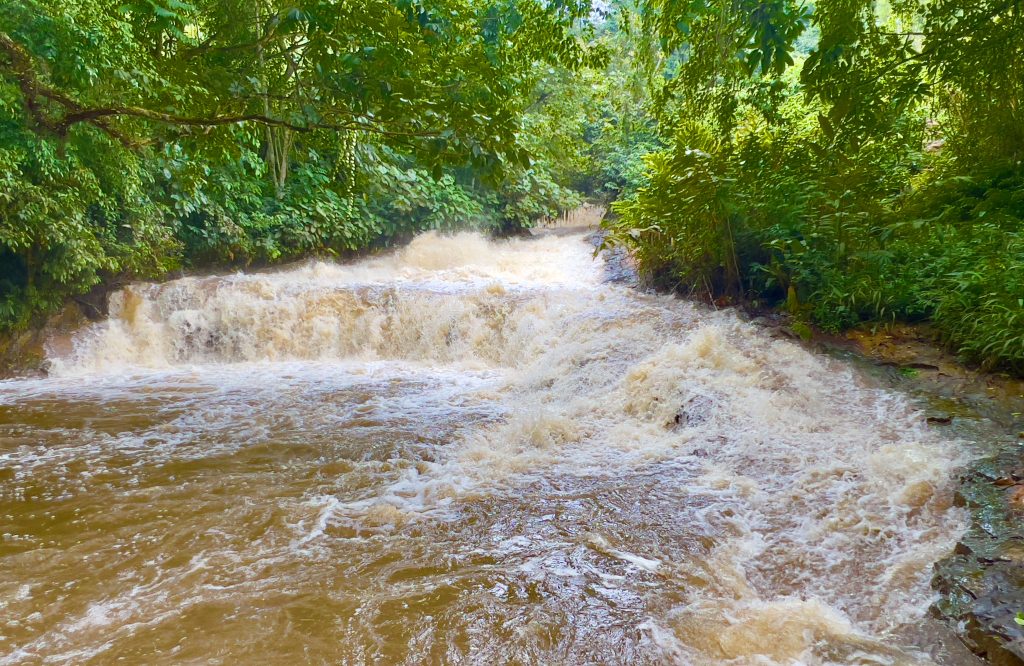
Railway Museum
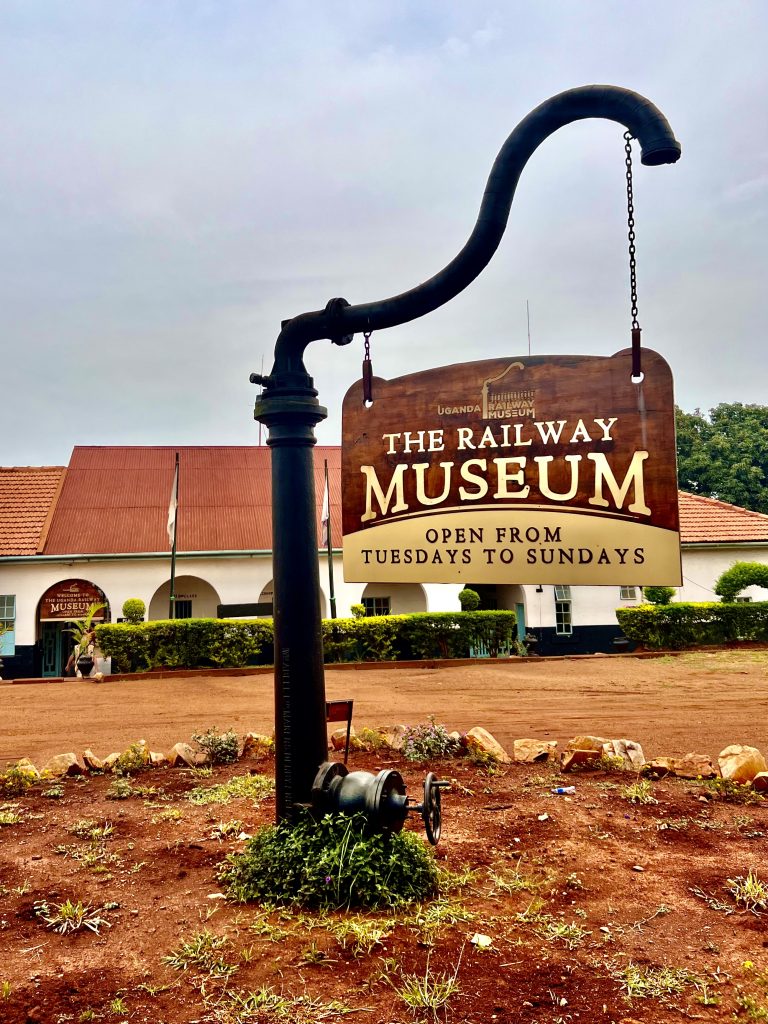
The Uganda Railway, the infrastructure masterpiece of colonial British East Africa, was key to the integration of present-day Kenya and Uganda into the modern world economy. Neighboring Kenya is said to be the only country in the world built around a railway, and its capital city, Nairobi, grew from a railway deport. The historic importance of the railway for East Africa simply cannot be understated.
The same can also be said about Jinja, as the the railway station was a key driver of the town’s growth. While the Ugandan side of the railway has fallen into disrepair, the old railway station has been turned into a museum, showcasing its importance for the emergence of modern-day Uganda.
With the recent accord between Kenya and Uganda to extend the Kenya Standard-Gauge Railway to Kampala and from there to Rwanda and DRC, the railway is likely to gain renewed importance for Jinja and vice versa.
King’s Palace
Contrary to neighbouring Kenya and Tanzania, Uganda has kept its traditional pre-colonial monarchies intact, albeit without the political power. Local royal families, therefore, are key cultural institutions, prominent in the local and national society.
The Busoga Royal Palace, located in the Eastern outskirts of Jinja, is a notable tourist attraction. Due to time constraints, I have never managed to visit it, but when time is not a scarce, I will have it on my checklist.
Nyege Nyege Festival





The Nyege Nyege Festival, first launched in 2015, is one of Africa’s biggest music events. For most of a week each year, the festival turns Jinja upside down. After a spectacular all-time high in 2019, Nyege Nyege disappeared for three years during COVID, reemerging with a bang in 2023.
Organized by a Ugandan collective of underground artists, the festival has become a hotbed for African electronic music, attracting significant numbers of international visitors. Considered a nuisance by some elements of Uganda’s more conservative government, it faced attempted bans in 2018 and 2022 on grounds of allegedly “promoting immorality.” Having survived both attempts, Nyege Nyege has likely grown too strong for any reactionary efforts to defeat it.
In 2019, I wrote the post below, which was also published as a guest article in See Africa Today, from that year’s Nyege Nyege Festival:
Uganda’s untapped tourism potential
With its fairly well-developed tourism facilities and activities, Jinja should inspire the rest of Uganda and even other parts of the East Africa region.
Uganda, with its pristine nature, dense jungles and rainforests, and breathtaking sceneries has all the potential in the world to develop itself into not just a major tourism destination, but an icon of Africa.
Even Jinja, with all its attractions, is hardly a top destination for international visitors to Africa, so clearly, more could be done still.
My last visit there was on a family Christmas vacation in 2023. From Jinja, our trip went much further off the beaten track: To the Sipi Falls on the western slopes of Mt. Elgon.
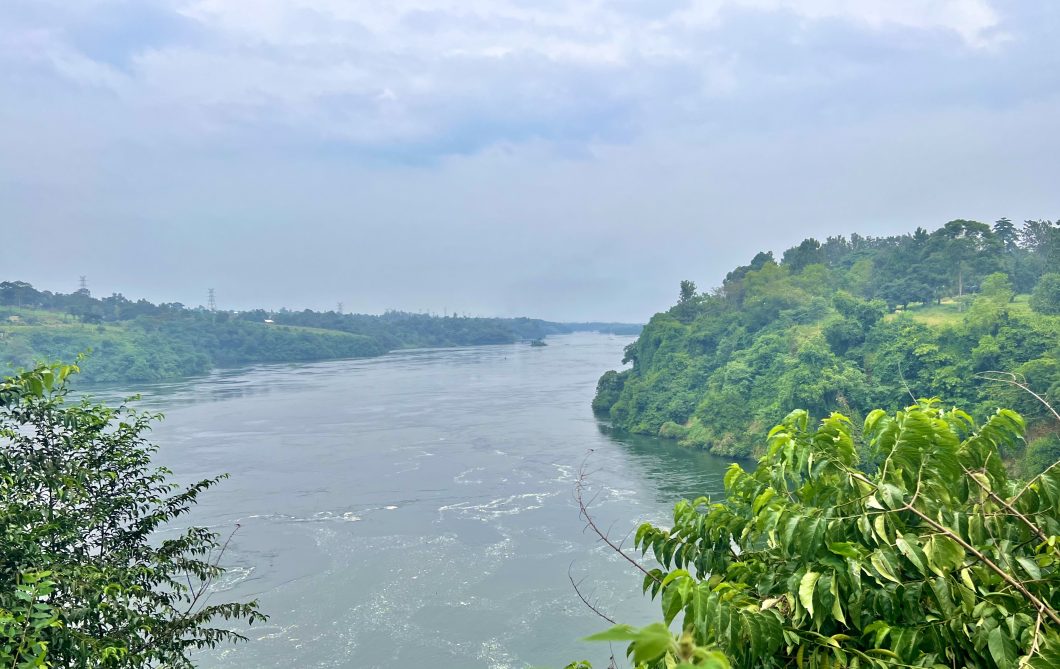
What a great write-up — I really enjoyed your thoughtful reflections on Jinja. I had a similar feeling when I stood at the Source of the Nile — something about being at the very beginning of this iconic river makes the moment feel both historic and strangely personal. I ended up spending a few days exploring beyond the usual stops and put together a full guide for other travelers — including rafting, tubing, Nile cruises, local food spots, and some Busoga cultural gems. In case it’s helpful to anyone planning a trip: https://wanderlusttrails.africa/jinja-uganda-thrilling-source-of-the-nile